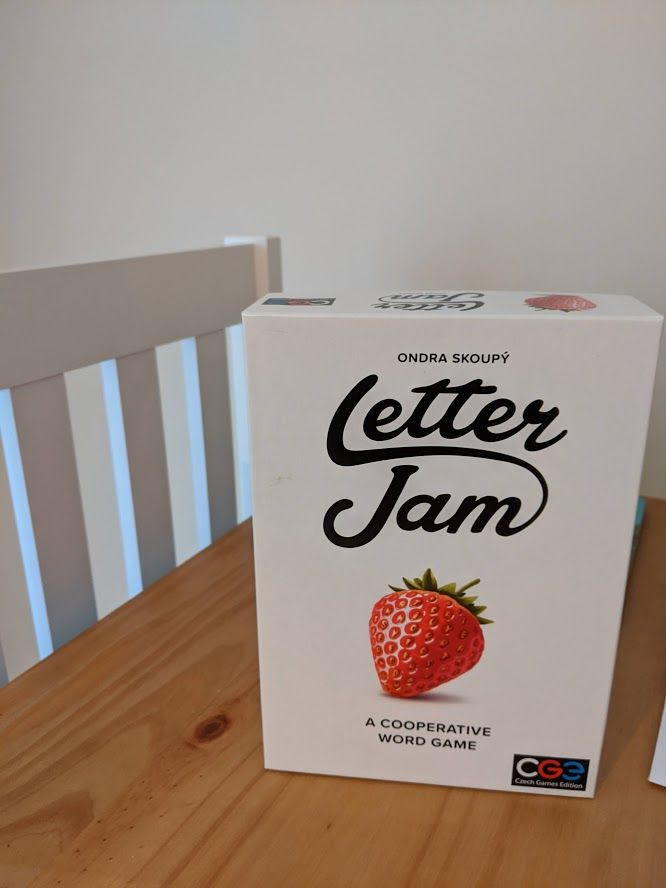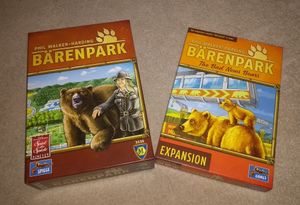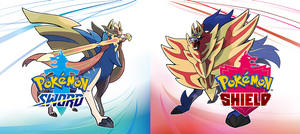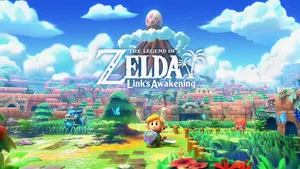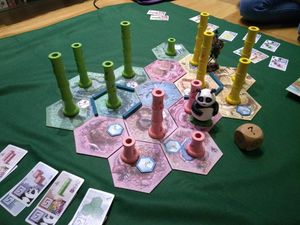There are a lot of different game genres out there and I can't think of any that I totally hate. In every case I can almost always find at least one game of that type that I like. There are a few that I am less keen on, though, as they are hard to do well and most of the time I play them it's a less than satisfactory experience. One of these lacklustre genres for me is word games. From my experience, they tend to involve long player turns so other players have to wait around a lot and there's almost always someone in the group who just isn't feeling it and so the whole thing falls a bit flat. Even a game that I'm a fan of, Paperback, suffers from these issues. Cooperative games is another of these hit or miss genres since games can often be controlled by one 'alpha' player who knows the game inside out and they just tell everyone else what to do. It can also be demoralising when you spend an hour or more playing a game and everyone loses, sometimes by random chance, but you also want it to be challenging because winning all the time is equally dissatisfying. Notable exceptions being Space Cadets where players are forced to focus on their own roles due to time pressure and Burgle Bros with a very strong theme and great balance of difficulty and luck vs strategy. With all this in mind, if someone asked me if I wanted to play a cooperative word game, I would probably be pretty unenthusiastic. But in 2019, Letterjam was released with a box bearing the slogan "A cooperative word game". Doesn't really sound like my cup of tea, but the game received rave reviews, and here comes another one…

To begin with, players are all dealt a stack of cards, each bearing a single letter. The letters must be used to create a word (five letters long for a standard difficulty game), which is shuffled and passed to the player on the right. Everyone then lays the word out face down in front of them such that all players have a scrambled word and they don't know what it is. Each player then takes the left-most letter from their word and places it in a stand in front of them so everyone can see the letter except for them. If playing with fewer than six players, extra letters are stood up in view of everyone so that everybody can see five letters. Once this is set up, players try to make a word out of the letters they can see. There is a 'wildcard' available for use as well, which can represent any one letter, to aid players if they are stuck. Players discuss who might have the best word, without revealing what it is, and then the chosen player will spell out the word by placing tokens next to the letters it uses. If someone lays one or more tokens down in front of your letter then you can use this as a clue to guess what your letter is. You might write down a clue like ?-A-T-S. Your letter could be C, or H, or perhaps B. Basically, that clue stinks, so you would probably wait to get another one to narrow it down. But if you get a good clue and you think you know what your letter is, you can lay it back down and stand up the next letter in your word. Once a certain number of clues have been given, or if everyone thinks they have correctly guessed all of their letters, the game ends. Players rearrange the face down letters in front of them into what they think is the word they were given and everyone flips over their word in a dramatic reveal. If everyone does this correctly, the whole team wins.

The components in the box are good quality with simple yet effective artwork. The clue tokens for tracking the number of clues given are taken from a nice flower card, which is different depending on the number of players. The shape cleverly determines how many clues can be given and by whom. On the reverse of the card is a scoring system if you wish to keep track of how well you do from game to game. Better scores can be achieved by attempting longer words, finishing with clues left over or collecting extra letters by finishing your word before other players. The score is still shared by all players so there is no incentive to be greedy here. The tokens for marking the letters are good, heavy poker chips, which gives you a nice feeling of satisfaction when you lay down an eight letter word. The cards themselves are even smarter than they initially seem with QR codes to scan on the companion app, which can be used to make random words for every player so nobody knows any of the words in play. It's not necessary, but a nice little addition.

So on to my thoughts on the game as a whole. I'm not sure I quite grasped how the game worked when I first started playing but after a couple of rounds everything fell into place. It all just comes down to looking at letters and trying to make words. But, as I said before, word games do tend to have a few flaws. Letterjam does away with these issues with very simple game design choices. Other word games suffer from players taking long turns as they struggle to find words, but in Letterjam, everyone is involved on every turn. You're always trying to make words with the available letters, and even if you don't give a clue, you're potentially receiving one and trying to work out your letter with the clues you have been given. This simultaneously solves the problem with co-op games where one player can take over. If one player does this and gives all the clues, they will have no clues for their letter and will never work out their word, so everyone loses. Also, if all players give a clue then an extra clue becomes available for the team to use (everyone has to give more than one clue for this in a two or three player game) to encourage everyone to get involved. The difficulty is also at a good level, you can make it harder or easier by attempting longer or shorter words but the key thing that makes this stand out from many other co-ops is that losing is generally pretty hilarious. Where other games can end in an instant of rotten luck with everyone sat around the table thinking they have wasted the last hour, Letterjam always makes it to the dramatic reveal at the end. Even if you haven't guessed all of your letters, you can make an educated guess at your word anyway. And if you get it wrong, you can still get some enjoyment out of revealing what you think is SPACE only to see SPANT in front of you.

Letterjam is without a doubt one of the best releases of the last few years for me. If you like word games, I can recommend Letterjam. If you like cooperative games, I can recommend Letterjam. If you don't like either I would still recommend Letterjam. It's a great game for keeping up to six players constantly engaged for a mind bending and funny 45 minutes. A truly unique experience not to be missed by any gamer.

